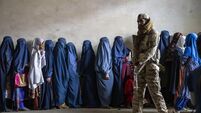Afghans in Ireland 'frantic' and desperate to be reunited with their loved ones

A man pulls a girl up to get inside Hamid Karzai International Airport in Kabul on Monday.
The Government must urgently introduce special visa schemes to allow people in Afghanistan who have family in Ireland to be reunited with them, refugee support bodies and legal experts have said.
It comes as various organisations in Ireland say they have been “inundated” with calls from distressed and frantic members of the Afghan community in Ireland deeply concerned for family in Afghanistan.













